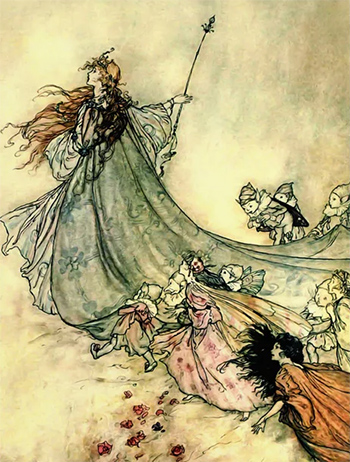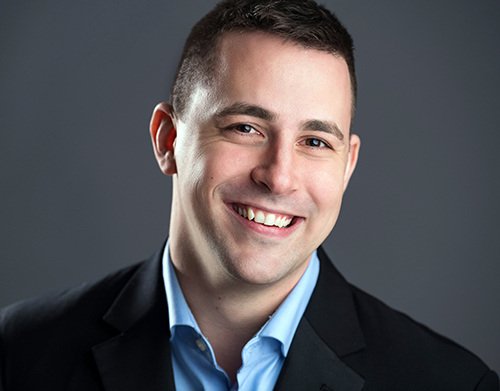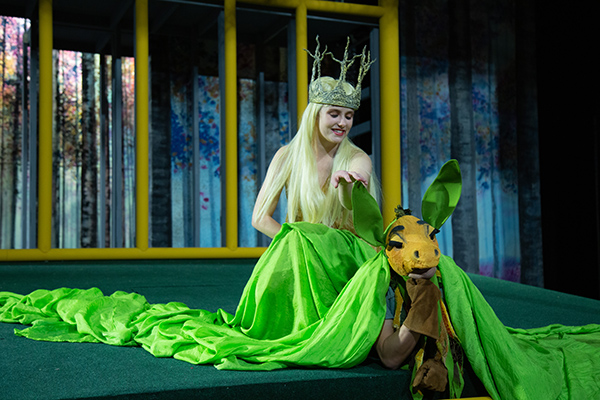by Mike Telin

On Wednesday, November 6 at 8:00 pm in Hall Auditorium, Oberlin Opera Theater will present Benjamin Britten’s A Midsummer Night’s Dream. Jonathon Field directs, and Christopher Larkin conducts the Oberlin Orchestra. Performances continue November 8 and 9 at 8:00 pm and the 10th at 2:00 pm. Tickets are available online.
“An interesting thing about this piece is the way it’s constructed,” Jonathon Field said during a recent interview. “Shakespeare’s play opens and closes in civilization, so you do feel grounded in our world. But in the opera, it opens and closes in the woods, so the fairies have the first and last word. Britten is almost saying that the irrational and mysterious are going to reign. And that’s where the idea of the dream comes in — that vague difference between reality and illusion.”
Field pointed out that at the end of each act, the responsibility of the fairies expands, almost like concentric circles. “They are the ones who guard the woods and can bring beneficial things to humans’ lives. At the beginning, they are concerned with Tytania, putting her to sleep and making her comfortable so that her beauty is preserved,” he said. “At the end of Act Two, when the four human lovers go to sleep, the fairies come in to administer a balm and blessing — the humans have been disastrously falling in and out of love with each other and are in need of healing. And at the end, the fairies bless the auditorium and the house, which Puck sums up with his famous last line ‘Give me your hand if we be friends and Robin shall restore amends.’”
This week’s performances of Britten’s opera will feature countertenor Andrew Lipian in the role of Oberon. I caught up with the Oberlin alum by telephone and began our conversation by asking him how it feels to be back performing on the Hall Auditorium stage.
Andrew Lipian: It feels like coming home. I see so many familiar faces. Every building brings back luscious memories, and Hall Auditorium is no exception. Standing on the stage singing, it looks and feels like it did of old. Although many parts of the building have changed, still the spirit of it — and getting to work with Jonathon Field — feels like a homecoming.
Mike Telin: Can you share any memories of being in the opera productions?
AL: Unfortunately, I came the year after they did Midsummer, but I was in the chorus of Candide. I auditioned just to see what would happen, and Jonathon convinced me that I would get a lot out of being in the chorus. I did end up doing it and he was right. He utilized the chorus members in so many ways — I got to use my dance experience, and project energy on the stage. He’s a tremendously creative guy and a delight to work with.
MT: This is your second time performing the role: please give me your take on Oberon.
AL: His character is idiomatic of the desire in all of us to get a leg up in the world. And sometimes, in our attempt to get what we want, we complicate things for other people and make things worse than they were before.
Oberon wants revenge against Tytania for taking the changeling boy from him. But it’s his pride that is wounded. I think he’s had a long history of struggles with her — not just a power struggle but a marital struggle as well. And I think the thing with the boy and the embarrassment he suffers in front of the fairies is the last straw for him.
I think he’s a sad figure because he’s put so much importance on his reputation and the way others perceive him, that he’s willing to go through any means to get revenge on her.
I find some inspiration with him in Nostradamus. I also see Richard III in that Oberon is so hungry for power. But by the end of the opera, he’s found out what a mess he’s made of things, and we do find out that there’s some good in him. I see him as a redeemed villain. As we say, he’s not a good fairy but he’s not the worst of the fairies either.
MT: How do you see Oberon’s relationship with Puck?
AL: I think it’s a bit abusive. Puck is willing to do anything that he can to please Oberon, and I think Oberon takes that for granted.
Puck too isn’t so innocent — he enjoys stirring the pot, and I think Oberon uses that to his advantage. But I do think the two of them are thick as thieves. I think Puck’s mischievousness feeds into Oberon’s fantasies, and his mischievousness feeds into Puck’s, so it’s a bit of a killer loop.
MT: Does Oberon’s music require you to use your full vocal range?
AL: The role doesn’t require my upper register at all — it’s in the middle to low range. Or as we would say for Alfred Deller, for whom the part was written, his entire range. It requires a little bit of a marriage with the chest voice, and as a countertenor that is a healthy thing.
The nice thing about Oberon is that you can hear chords and melodic inventions that smack of Purcell. For example, the glockenspiel in “I know a bank” is reminiscent of Purcell’s Sweeter than roses. So in a way, this opera feels like a culmination of the countertenor history.
MT: Do you ever feel typecast by being a countertenor?
AL: I don’t feel typecast. There are all sorts of great roles opening up to countertenors because modern composers have discovered that it’s a wonderful voice to work with.
MT: I understand you’re from Northeast Ohio.
AL: That’s right. I was born in Parma and raised in Grafton.
MT: At Oberlin you studied with Kendra Colton. Would you like to give a shout-out to her?
AL: She sacrificed a lot for me, as she does for all her students. I was her first countertenor, and she was ready and eager for the challenge. She brought energy and passion to every lesson that I had. I just had a chance to sit in on her studio class today, and had a chance to give her a hug and exchange greetings.
MT: You’re also a composer and have written a lot for video games.
AL: My love for video game music is equal to classical music. An influence from my youth was the composer Nobuo Uematsu from the Final Fantasy series. The music is so beautiful. I used to go to preschool humming Mega Man tunes.
When I went to the University of Michigan for my master’s, I had the opportunity to take a video game music class. My composition was picked as a winner for the Game Audio Network Guild (G.A.N.G.) scholarship — I got an all-expense paid trip to the Game Developers Conference. I’m now on their board of advisors.
No matter what I’ve done in my career, I’ve always found ways of wrapping video game music into it. When I was the production director at the Lorain Palace Theater, I brought Video Games Live to perform there. It’s a wonderful world. I love to make video game music and I love to perform it — it’s one facet of the many-faceted stone of arts activities that I’m involved in.
Photos: Arthur Rackham’s Queen of the Fairies; Andrew Lipian by Yevhen Gulenko; Greta Groothuis (as Tytania) and Evan Lindberg (as Bottom).
Published on ClevelandClassical.com November 5, 2019.
Click here for a printable copy of this article




